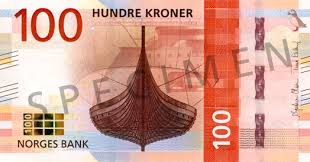
The trade tensions across the globe have driven down the price of oil throughout the world which has hit Norway’s krone which touched its lowest level since the 2008 financial crisis. This significant drop in the value of the krone now threatens large sections of the Norwegian economy.
The Norwegian currency on Wednesday touched 10.097 per euro in Oslo which marked its lowest point since December of 2008 when the global financial crisis was at its peak.
Since the announcement by Trump of imposing a fresh round of tariffs on Chinese goods and China alleging letting its currency fall freely to cushion the impact of the trade war, there has been a 12 per cent drop in the price of Brent crude. The global demand for commodities and global economic growth is being hurt by the trade disputes of not only between the US and China but also threat s of trade war between the European Union and the US.
Norway is the largest producer of petroleum products in Western Europe and most of its goods are imported from funds that are generated from the sale of oil and natural gas.
“The obvious culprit today is the renewed slide in oil prices,” said Andreas Steno Larsen, a currency strategist at Nordea Bank. “There’s basically thin air above technically, which leaves NOK at risk ahead of the important CPI number on Friday.”
This drop in the value of the currency assumes significance because an interest rate announcement is slated to be made by the country’s central bank August 15. According to reports based in the indications and signals issued by the bank, it is likely to announce a hike in interest rates as soon as this September. The comments made by the bank’s Governor Oystein Olsen on the commitment to tightening the economy have surprised the markets. For a third time in less than a year, Norway’s central bank had raised rates in June.
The considerations and deliberations of the Norwegian central bank is likely to be heavily weighed down upon and influenced by the growing concerns over possible impact on the Norwegian economy of the trade disputes. However according to analysis, it would be easier to tighten again if the currency is weakened in isolation.
The krone was also hit by last week’s not so good economic data of the country. There was a marked contraction in overall economic activity as shown by the purchasing managers’ index. On the other hand, there was also a drop in retail sales and a slowing in the growth of household credit. This was compounded by a more than expected rate of growth in the registered unemployment numbers.
(Source:www.bloomberg.com)
The Norwegian currency on Wednesday touched 10.097 per euro in Oslo which marked its lowest point since December of 2008 when the global financial crisis was at its peak.
Since the announcement by Trump of imposing a fresh round of tariffs on Chinese goods and China alleging letting its currency fall freely to cushion the impact of the trade war, there has been a 12 per cent drop in the price of Brent crude. The global demand for commodities and global economic growth is being hurt by the trade disputes of not only between the US and China but also threat s of trade war between the European Union and the US.
Norway is the largest producer of petroleum products in Western Europe and most of its goods are imported from funds that are generated from the sale of oil and natural gas.
“The obvious culprit today is the renewed slide in oil prices,” said Andreas Steno Larsen, a currency strategist at Nordea Bank. “There’s basically thin air above technically, which leaves NOK at risk ahead of the important CPI number on Friday.”
This drop in the value of the currency assumes significance because an interest rate announcement is slated to be made by the country’s central bank August 15. According to reports based in the indications and signals issued by the bank, it is likely to announce a hike in interest rates as soon as this September. The comments made by the bank’s Governor Oystein Olsen on the commitment to tightening the economy have surprised the markets. For a third time in less than a year, Norway’s central bank had raised rates in June.
The considerations and deliberations of the Norwegian central bank is likely to be heavily weighed down upon and influenced by the growing concerns over possible impact on the Norwegian economy of the trade disputes. However according to analysis, it would be easier to tighten again if the currency is weakened in isolation.
The krone was also hit by last week’s not so good economic data of the country. There was a marked contraction in overall economic activity as shown by the purchasing managers’ index. On the other hand, there was also a drop in retail sales and a slowing in the growth of household credit. This was compounded by a more than expected rate of growth in the registered unemployment numbers.
(Source:www.bloomberg.com)














